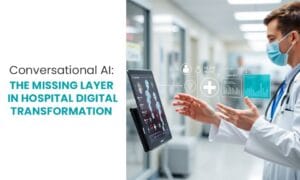
The healthcare sector stands at a defining crossroad where artificial intelligence (AI) isn’t just supporting decision-making but beginning to drive it. As hospitals and clinics race to digitise, terms like “AI agents” and “agentic AI” surface more frequently. While both stem from the same technological roots, their applications and impacts vary widely.
AI agents refer to software programs designed to perform specific healthcare tasks based on input data. Think of them as intelligent assistants helping clinicians sort through patient data, schedule tasks, or analyse diagnostics. On the other hand, agentic AI reflects a more autonomous and proactive approach—these systems not only assist but also make decisions, adapting dynamically to patient needs and real-time scenarios.
Understanding the Core: What Are AI Agents and Agentic Systems in Healthcare?
To truly understand the buzz around artificial intelligence in healthcare, it’s crucial to define both concepts clearly.
AI Agents are intelligent software components that respond to external inputs. In the context of healthcare, they monitor vitals, assist in early diagnosis, recommend treatment paths, or even automate patient communication. These agents operate under pre-defined conditions and often work alongside medical professionals.
Agentic AI, however, takes autonomy a step further. These systems display a degree of self-direction, adaptability, and learning. Rather than waiting for commands, agentic systems initiate actions. For example, an agentic AI can detect anomalies in patient data, run its own analyses, and suggest immediate care adjustments.
Functionalities of AI Agents:
- Data sorting and structuring
- Appointment scheduling
- Medical imaging analysis
- Routine alerts and reminders
- Functionalities of Agentic AI:
- Real-time anomaly detection
- Personalised treatment plan creation
- Autonomous workflow optimisation
- Continuous learning from clinical outcomes
This distinction becomes increasingly important as hospitals demand smarter technologies that go beyond repetitive automation.
Real-World Applications: How AI Agents Are Powering Modern Healthcare Systems
Hospitals today don’t just need AI; they need intelligent, adaptable systems. AI agents play a pivotal role in enhancing efficiency and minimising manual work. For example, AI-powered virtual agents for patient support are currently revolutionising front-desk interactions. Patients can now reschedule appointments, get prescription reminders, and access FAQs without human intervention.
At Mayo Clinic, AI agents help in radiology departments by analysing scans and marking areas of concern. These agents significantly reduce workload and error rates. Another real-world example comes from Cleveland Clinic, where AI-based agents assist in triaging patients via chatbot interfaces, ensuring patients receive timely care.

The Rise of Agentic AI: Toward Autonomous Decision-Making in Medicine
Agentic AI is making bold strides in medicine. Unlike AI agents, these systems perform without waiting for specific commands. In high-stakes situations like ICU management or stroke care, agentic AI can monitor real-time data and make recommendations or adjustments without human prompts.
In Israel, an agentic system has been deployed in emergency units to identify patients at risk of sepsis and initiate early alerts. These systems learn from previous incidents and adapt accordingly.
Role of agentic AI in patient care continues to expand, with the ability to:
• Monitor health metrics in real-time
• Automatically adjust ventilator settings based on lung performance
• Identify drug interactions and contraindications
AI Agents vs Agentic AI: Key Differences That Healthcare Providers Must Know
Understanding the key differences between these systems helps decision-makers choose the right tools. Below is a comparison table that clarifies their core distinctions:
| S.No | Feature | AI Agents | Agentic AI |
| 1 | Functionality | Reactive | Proactive & Autonomous |
| 2 | Decision-Making | Assists with decisions | Makes independent decisions |
| 3 | Learning Ability | Minimal or task-specific | Continuous learning & adaptation |
| 4 | Human Involvement | High | Moderate to low |
| 5 | Use Case | Chatbots, Diagnostics Support | ICU Monitoring, Emergency Response |
The comparison between AI Agents and Agentic AI provides essential insights into how artificial intelligence is evolving in healthcare. While both types of AI serve crucial functions, their scope and autonomy greatly differ.
AI Agents are primarily reactive systems. They require human input and follow programmed pathways to assist healthcare professionals with tasks like scheduling, data organisation, and diagnostics support. These agents offer limited learning capabilities and depend heavily on human oversight. As such, they enhance efficiency without replacing clinical judgement.
In contrast, Agentic AI is a more advanced form of intelligence that operates proactively and autonomously. It can make independent decisions, adapt to new situations through continuous learning, and function with minimal human involvement. This makes agentic systems ideal for high-stakes environments such as ICU monitoring and emergency response, where immediate, data-driven actions can save lives.
Understanding these distinctions helps healthcare providers adopt the right technology for the right use case. While AI Agents streamline repetitive tasks, Agentic AI enables smarter, faster medical decisions—paving the way for more responsive and patient-centric care systems. Ultimately, integrating both approaches responsibly is key to building the hospitals of tomorrow.
Trust, Transparency & Ethics: Should We Let Agentic AI Make Life-Saving Decisions?
The question isn’t just about performance but about trust. Should agentic systems decide on critical care pathways? Ethical debates around artificial intelligence in healthcare often revolve around accountability.
If a machine makes an incorrect decision, who bears the liability? Many experts advocate for “explainable AI” to ensure every decision can be traced and understood. Hospitals must also consider patient consent when deploying autonomous tools.
Healthcare is a deeply human field. Integrating agentic AI must not erode the empathy patients expect. Transparency in algorithms and ethical oversight remain paramount.
Human-AI Collaboration: Striking the Right Balance in Patient-Centric Care
Rather than viewing AI as a replacement, the future lies in collaboration. AI agents can support doctors by analysing mounds of data in seconds, allowing physicians to focus on empathy and decision-making.
At Mount Sinai, clinicians and AI agents work hand-in-hand during surgeries where real-time data interpretation is crucial. This not only improves outcomes but builds trust in AI-powered healthcare systems.
How AI agents are transforming healthcare goes beyond automation. It represents a co-pilot model, where AI enhances but never replaces human judgement. This collaborative approach paves the way for better emotional intelligence in healthcare, combining the best of machines and mankind.
Impact on Patient Outcomes: Are AI Agents Improving Care or Just Data Handling?
Patient outcomes remain the gold standard in healthcare evaluations. So, do AI agents and agentic systems really improve care?
The answer lies in metrics. Hospitals that implement AI agents for early diagnosis report a 15-20% drop in readmission rates. Meanwhile, agentic systems in ICUs have shown to reduce patient mortality by enabling earlier interventions.
Artificial intelligence in healthcare is no longer just about efficiency. It’s about better clinical outcomes, faster recoveries, and more personalised care.
What the Future Holds: AI Agents, Agentic Systems, and the Next Generation of Smart Hospitals
Looking forward, the synergy of AI agents and agentic AI will redefine smart hospitals. Imagine a facility where virtual assistants handle logistics, agentic systems manage emergency decisions, and human professionals lead with empathy and oversight.
Hospitals of the future will be:
• Fully digitised with real-time decision support
• Equipped with AI-powered virtual agents for patient support
• Guided by ethical frameworks ensuring transparency
Artificial intelligence agency will play a pivotal role, driving both the back-end workflows and front-end care delivery. As the line between support and autonomy blurs, healthcare must remain focused on one goal: better, faster, and more compassionate patient care.
Conclusion
As AI continues to evolve, distinguishing between AI agents and agentic systems becomes vital for healthcare providers. From support roles to decision-making, these technologies shape how care is delivered, evaluated, and experienced.
With the right blend of trust, ethics, and innovation, AI in healthcare will usher in a new era of smart, responsive, and human-centric medicine.





